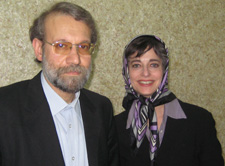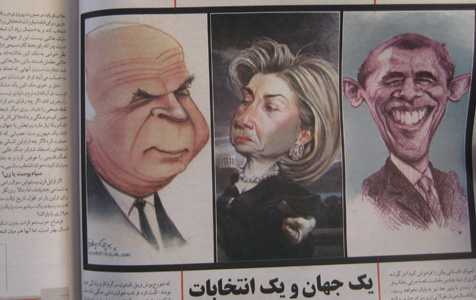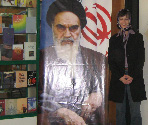Senior Fellow Barbara Slavin has been senior diplomatic reporter for USA Today since 1996. Now on her seventh trip to Iran, Slavin interviewed veteran political figure and newly elected member of parliament, Ali Larijani.
Senior Fellow Barbara Slavin has been senior diplomatic reporter for USA Today since 1996. She is currently on leave from the newspaper and focusing her USIP fellowship on her research project, "Iran Rising: Iran and its Clients in the Middle East."
 The project examines the rise of Iran’s regional influence in three current conflicts: Iraq, Lebanon, and the Palestinian Territories. Slavin draws on many years of reporting on the Middle East, which includes trips to Iran and other countries, extensive coverage of U.S.-led negotiations between Arabs and Israelis, the Iran-Iraq war, the evolution of the Palestine Liberation Organization, and the resurgence of Islamic fundamentalism, among many other issues.
The project examines the rise of Iran’s regional influence in three current conflicts: Iraq, Lebanon, and the Palestinian Territories. Slavin draws on many years of reporting on the Middle East, which includes trips to Iran and other countries, extensive coverage of U.S.-led negotiations between Arabs and Israelis, the Iran-Iraq war, the evolution of the Palestine Liberation Organization, and the resurgence of Islamic fundamentalism, among many other issues.
This month, Slavin is on her seventh trip to Iran, where she interviewed veteran political figure and newly elected member of parliament, Ali Larijani. In a March 12 article, Slavin discusses Iranians' impressions of elections in both their country and the U.S.
Ali Larijani, a veteran official in Iran's Islamic government and the country’s former chief nuclear negotiator, has just won his first elected position as a member of Iran’s 290-seat parliament. Larijani gave an exclusive interview to Barbara Slavin on March 15.
An intellectual who wrote his doctoral dissertation on the German philosopher Immanuel Kant, Larijani, 50, resigned last October from his nuclear post because of differences with Iranian President Mahmoud Ahmadinejad. Larijani now hopes to become speaker of the parliament, a position of some influence in Iran.
An ambitious man close to Iran's Supreme Leader, Ayatollah Ali Khomenei, Larijani is the son of a grand ayatollah and ran from the Iranian spiritual capital of Qom. He received more than 75 percent of the votes. The following is an excerpt from their conversation in Qom:
Slavin: Two years ago, when you were Iran's national security adviser, I interviewed you and you made an overture for negotiations to the Bush administration. You called our national security adviser a 'logical thinker.' Do you still have this opinion of Stephen Hadley?
You have a good memory. My idea has changed. I didn't see him perform a miracle during this time. There were some good opportunities that emerged but unfortunately no good responses from them.
Slavin: There have been a number of proposals over the years for contacts between our Congress and your parliament. Would you approve of such contacts?
We have to wait for the proposals and see if there is anything tangible or useful put forward. The things we have received so far were perfunctory and lacked content. Therefore we didn't see any reason to tread on this path. We have to see our interest, some utility in this.
Slavin: Recently, U.S. participants in Track II diplomacy with Iran suggested that the nuclear impasse could be resolved by establishing an international consortium to enrich uranium on Iranian soil. Could this be a solution?
They are not official authorities. There are a lot of similar proposals in the international arena but we don't really see any substance. The authorities of the Bush administration are still sticking to their guns, repeating the same thing they said before. We haven't seen any new initiative from them.
Slavin: What if such a proposal came from the U.S. government?
If it's proposed, we can study it.
Image on right: Slavin with Ali Larijani, Iran's former chief nuclear negotiator and newly elected member of parliament.
 Slavin: In the fall of 2006, there were reports that you were coming to New York and had agreed to a short suspension of uranium enrichment so talks could start but that didn't happen because Ahmadinejad interfered.
Slavin: In the fall of 2006, there were reports that you were coming to New York and had agreed to a short suspension of uranium enrichment so talks could start but that didn't happen because Ahmadinejad interfered.
I think you have a wrong impression here. We never talked about stopping enrichment. (EU foreign policy chief Javier) Solana proposed a meeting in New York of the five plus one (Britain, France, Russia, China, the United States and Germany). He was after suspension but we didn’t accept that.
Slavin: Talk a bit about Iran's regional role.
About Lebanon, we have had a lot of negotiations with Saudi Arabia. We have had some cooperation with the French and Amr Moussa (the head of the Arab League) but unfortunately, the Americans hindered everything… The Americans (also) have some terrorist behaviors.
Slavin: What terrorist behavior?
Imad Mughniyeh, was he assassinated by Hezbollah?
Slavin: So who killed him?
The Americans with the help of the Zionists…The U.S. helps the Zionists to invade and attack the Palestinians. Do you think what we now see in Gaza can it be justified? How are we really going to move toward the stability in the region? The actions taken by the Americans, whatever the results of the conference in Annapolis, are doomed now. Annapolis is dead.
On Iraq, from the very outset we were after the creation of the government from the people. You know very well what countries in the region are opposed to this idea. The terrorist acts that are carried out in Iraq, who is behind them? There are some extremists … these extremists are opposed to us. It doesn’t take a rocket scientist to understand this.
Slavin: You have said that you want to be in parliament because it is the one body in Iran that can't be dismissed by anyone.
Yes, it is independent.
Slavin: And it seems that the new parliament will be more critical of Ahmadinejad and will take a tougher position on issues?
It isn't a matter of being opposed. There is a kind of misunderstanding. We have to take a very precise approach to solve the problems of the people.
Slavin: It has been reported that you have formed a coalition with Mohsen Rezaie (the former commander of the Revolutionary Guards) and the mayor of Tehran, Mohammad Baqr Qalibaf, and may support Qalibaf as the next president and that you might be foreign minister. In my book, I have suggested that you want to be the Henry Kissinger of Iran.
My political life is not really coupled with fantasy.
The idea that you would negotiate an end to the 30-year rift with the United States doesn't seem like a fantasy to me.
You are getting ahead of yourself. There are more important issues that we have to spend our time on right now, economic and political affairs and other development issues.
Does it matter to Iran who the next president of the U.S. will be?
I don't want to have a view on this because there are enough quarrels among these different candidates.
March 12, 2008
Writing in a special supplement of a reform newspaper, The National Trust, reporter Kaveh Shojaee described John McCain as a courageous Vietnam vet who won the Republican nomination by "remaining determined about subjects he believes in, such as immigration reform, countering global warming and banning torture." Shojaee would prefer a Democrat to win next fall because McCain is old and has threatened to bomb Iran. Still, "no doubt if he (McCain) becomes the American president, the world will witness an America much different from (President) Bush's," Shojaee wrote.
Shojaee described the U.S. election campaign as a "more captivating game" than the upcoming Beijing Olympics. Many Iranians appear as or more interested in the U.S. presidential race than in their own elections on March 14. More than 4,000 candidates are running for the 290-seat parliament. But the campaign is short — only one week — and there is little suspense about the outcome. Widespread disqualification of prominent reformists by a clerical body insures that conservatives will retain a majority. The only question is whether those conservatives will be close supporters of Iran's president, Mahmoud Ahmadinejad, or somewhat more critical of the president's failed economic policies and confrontational rhetoric.
 Elected in 2005, Ahmadinejad has isolated Iran by forecasting Israel's demise and minimizing the Holocaust. At home, his efforts to help the poor by doling out Iran's oil windfall have fueled inflation of more than 20%. Meat costs $5 a pound in a country where the average monthly salary is about $700. Housing prices have doubled in two years, with small Tehran apartments selling for the equivalent of a million dollars. According to Saeed Laylaz, a columnist and former deputy interior minister, the price of gas is about to rise, after the Iranian New Year March 21, to more than $1 a gallon — low by U.S. standards but extremely high for this oil-producing nation.
Elected in 2005, Ahmadinejad has isolated Iran by forecasting Israel's demise and minimizing the Holocaust. At home, his efforts to help the poor by doling out Iran's oil windfall have fueled inflation of more than 20%. Meat costs $5 a pound in a country where the average monthly salary is about $700. Housing prices have doubled in two years, with small Tehran apartments selling for the equivalent of a million dollars. According to Saeed Laylaz, a columnist and former deputy interior minister, the price of gas is about to rise, after the Iranian New Year March 21, to more than $1 a gallon — low by U.S. standards but extremely high for this oil-producing nation.
Pointing to this dire record, reformers close to Ahmadinejad's predecessor, Mohammad Khatami, are urging Iranians to vote. They are fielding about 250 candidates nationwide and are hoping to win at least 50 seats.
"If we can get 50 seats, we can have a voice in the parliament and set the stage for presidential elections" next year, Mohammad Jamshidi Gohary, a reform candidate, told a small rally in Tehran last weekend. Winning seats, particularly in the provinces, would boost reformers' chances in the presidential elections by making it easier to rent headquarters and distribute campaign literature.
The argument resonates with some Iranians. Hadi Nili, a journalist, says he will go to the polls to send a message to the Iranian government that "we want the right to vote for people we like."
Image on left: Slavin next to poster of Ayatollah Ruhollah Khomeini at press conference held by Iranian conservative candidates
 Many other Iranians appear to see the elections as a closed game among regime supporters. The conservatives have splintered into at least three factions — all of whom call themselves "principalists." The overall effect is like that of the old Monty Python skit featuring the sensible party, the silly party and the very silly party. "We don't care about them," said one Iranian businesswoman. "They live their lives; we live ours."
Many other Iranians appear to see the elections as a closed game among regime supporters. The conservatives have splintered into at least three factions — all of whom call themselves "principalists." The overall effect is like that of the old Monty Python skit featuring the sensible party, the silly party and the very silly party. "We don't care about them," said one Iranian businesswoman. "They live their lives; we live ours."
An Iranian lawyer who also chose to remain nameless said he has voted just once: — in 1997 for Khatami. "I was deceived into participating then but that won't happen again," he said.
Meanwhile Iranians eagerly consume news about McCain, Hillary Clinton and Barack Obama and speculate which would try hardest to restore relations with Iran, broken nearly three decades ago. Mohammad Atrianfar, publisher of many reform newspapers and magazines, said he prefers Clinton because he fondly remembers her husband's "soft words to Iran." Hillary Clinton also behaved well during the Monica Lewinsky scandal, Atrianfar says. "Her logic and wisdom overcame her emotions."
Shojaee says the U.S. campaign is projecting a positive impression of America: "After the wars in Iraq and Afghanistan, Americans were losing their reputation but this election is changing the world's view of the United States."



